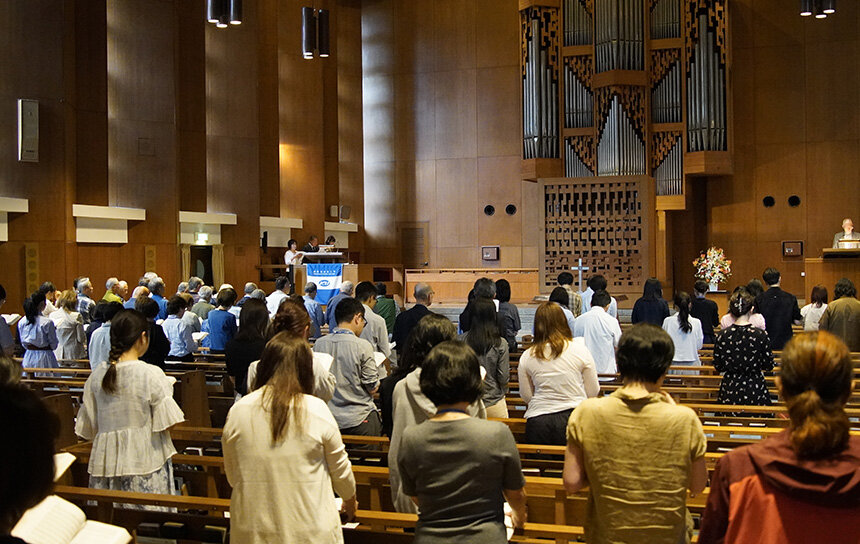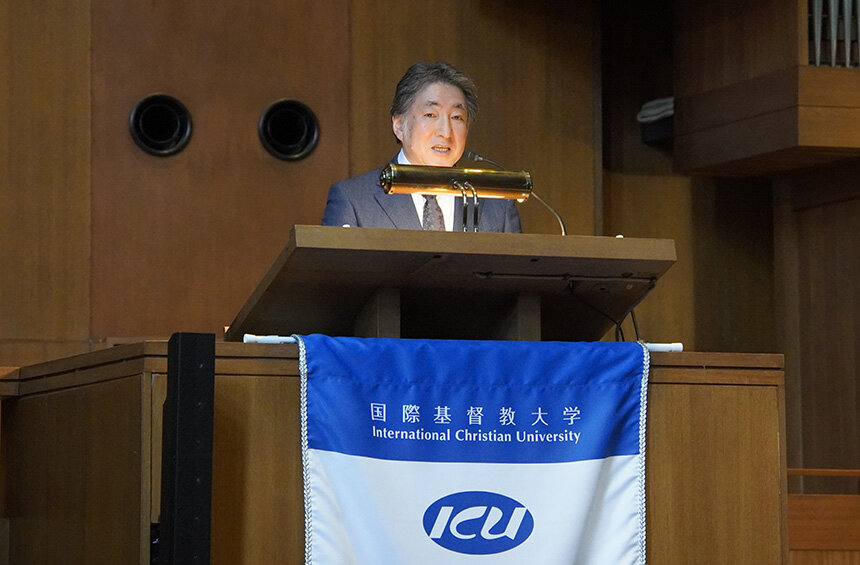NEWS
ICU Founder's Day Commemorative Service
Update: June 11, 2025

A service to commemorate ICU's founding was held at the University Chapel on June 10 (Tue.).
The service is held every year in remembrance of the day when the university was officially established at a meeting of the organizing council of Japanese and North American Christian leaders who gathered at YMCA Tozan-so in Gotemba, Shizuoka Prefecture, on June 15, 1949. On the same day, the Board of Councilors and the Board of Trustees were inaugurated, and the founding principles as well as a fundamental education plan were laid down.
At the service presided over by Acting Director of Religious Center, Professor Jeremiah Alberg, "True - Hearted, Whole - Hearted, Faithful and Loyal" was sung and Matthew 7:24-27 was read. President Shoichiro Iwakiri delivered a message titled "We Wouldn't Need Hope If We Could Foresee Everything".
Message by Shoichiro Iwakiri, President

This year, ICU celebrated its 76th anniversary.
The inaugural class entered ICU in April 1953, 72 years ago. This milestone was preceded by the pivotal meeting held at the Tozanso in Gotemba on June 15, 1949--now commemorated as ICU Founder's Day--where the name of the university and mission were formally resolved, setting the foundation four years before the first class matriculated.
As you well know, the University was founded on Christian principles, seeking to create a liberal yet reverent academic environment, to nurture promising individuals devoted to serving God and humanity as global citizens fostering enduring peace. The University's name embodies its international, Christian, and academic commitments, reflecting its unwavering dedication to fulfill its mission.
Following World War II, the Supreme Command of the Allied Powers (GHQ) occupied Japan for seven years, from 1945 to 1952. The years between ICU's founding and its official opening coincided with Japan's restoration of sovereignty after the occupation. As post-war Japan embraced a new era, ICU also stepped forward into the future.
With the rapid acceleration of globalization, many Japanese universities now include "International" in their name. ICU, however, was the first to do so. When the University was founded in 1949, Japan lacked formal diplomatic relations with other nations, making it especially significant to include "International" in its name. We cherish the spirit of the founders, carrying forth this zeal with energy and enthusiasm. Grounded in the three virtues of faith, hope, and charity--especially Christian love--we will maintain an international perspective, instilling within us a peacebuilding mindset through dialogue. We aspire to deepen our mutual understanding of the world and humanity, grounded in shared and cultivated wisdom. As we commemorate our Anniversary at this service today, we reaffirm our commitment to fostering an environment that supports the fulfillment of our mission.
On the first floor of the Troyer Memorial Arts and Sciences Hall--known as T-kan--we have a café named Ilyon, which is another term for Troy, the legendary setting of Homer's Iliad. Named after Dr. Troyer, our founding Vice President for Academic Affairs, the building inspired the name of the café by the similarity of sound --a tribute that echoes his legacy.
*
Iliad tells us that the Trojan King Priam had a daughter named Cassandra, who was a priestess of the Temple of Apollo. I think you are familiar with her story. Apollo gave her the power to prophesize, but when she spurned his immoral advances, he retaliated with a curse so that no one would ever believe her prophecies.
Christa Wolf (1929-2011), a renowned author of the former East Germany, wrote the novel Cassandra, narrating the story through its eponymous protagonist's voice. Published in 1983, the novel emerged during Germany's division between the liberal West and the socialist East.
Let me briefly introduce the background to the story. After a decade of war and the successful destruction of Troy, the Greek commander Agamemnon returns triumphantly to his homeland Argos, bringing Cassandra as a war prize. With unsettling clarity, she foresees both her own fate and Agamemnon's. As she waits in the carriage before entering the castle, an acute awareness grips her--the inevitable ruin that will soon consume both her and the king.
Wolf allows her to reflect on her emotions amidst the chaos of the Trojan War, as the looming collapse of her city draws near.
"So what made people hope, what made us all hope that this particular king, my father Priam specifically, would break the chain of misfortune; that he would be the one to restore the Golden Age? Why are we carried away by the very wishes that are grounded in error?"
Wolf, C. (1988) Cassandra p. 37(J. Heurck, Trans.) Farrar, Straus and Giroux. (Original work published in 1983)
Six years after the novel was published, the Berlin Wall fell: East and West Germany were unified. Wolf was critical of East Germany's lack of freedom, yet she opposed unification, advocating for the former East German state to be reestablished as an independent nation. History did not unfold as she anticipated, yet Cassandra's words in the novel offer a strikingly realistic perspective on our present, 50 years after its publication. The current U.S. President asserts that "the golden age begins right now" with a slogan "Make America Great Again", a vision widely embraced by many citizens. About a decade ago, a Japanese political party won the Lower House elections with the slogan "Take back Japan," (Nippon wo torimodosu) in reference to the lack-luster economy that had persisted since the bubble burst 20 years earlier. A decade hence, people now use the expression, "the lost 30 years."
Can we truly reclaim past glory by merely replicating it for the future? Politics and economics are not my specialty, but I can see that reclaiming a past era of glory would unfold within a vastly different society and industrial framework, enriched by liberal dialogue and diversity. Current leaders seem to prioritize their own nation's interests, sometimes at the expense of others' dignity and well-being. They emphasize barriers, exclusion, and coercion over open dialogue among diverse parties, in stark contrast to those who envision global peace through cooperation, symbiosis, liberal discourse, and an inclusive, diverse environment.
A usage example for innovation in the 19th century French dictionary Bescherelle cites, Il est un genre d'innovation tout aussi dangereuse que les autres; c'est le renouvellement des choses surnannées.(There is a kind of innovation just as dangerous as the others: the revival of outdated things.) Reframing outdated ideas as innovations and leveraging them to reshape society and industrial frameworks may, from the perspective of progress, appear regressive. This is because the vision evoked by words like "again" and "regain" leaves little room for the accidental and spontaneous--the creative spirit that seeks the new, beyond what existed in the past.
*
On this day, we commemorate the founding of the University to reflect on our mission. Does this mean returning to the past? What makes ICU compelling is its commitment to foundational principles while embracing the philosophy of a "university of tomorrow." This vision intertwines with a forward-thinking spirit, opening the institution to the future and contributing to the creation of a better world--one unburdened by the constraints of past ideologies.
The priestess Cassandra foresaw all that the future held. One who sees everything lacks hope, for hope is a divine gift to humanity--an act of faith in a future whose fulfillment remains uncertain.
We cultivate the wisdom of global citizens within a liberal and reverent academic environment, guided by faith, hope, and charity. In service to God and humanity, we strive to build a world of peace and remain committed to this mission throughout our lives.
This philosophy remains steadfast, yet its implementation evolves to meet the needs of the times. In today's world, where the natural environment is threatened, inequality is rising, and conflict persists, we must uphold a vision of harmony between humanity and nature. Mutual respect among people is essential, fostering a future where everyone can find happiness without exploitation, violence, or harm.
We are committed to shaping a better future through education, research, and the enrichment of campus life and the surrounding environment.
Each day marks a new beginning, filled with fresh discoveries. What we inherit from the past flourishes like leaves on a tree, illuminated by sunlight filtered through the branches.
The founders' spirit lives on, continually revitalized each day.
May ICU continue to uphold its spirit, evolving while staying true to its founding principles.
Let us pray.
Our Lord, have mercy upon us here on earth. Merciful God, grant us universal peace. As you have guided us to this day, continue to lead us along the righteous path. May ICU faithfully serve as a disciple of your divine purpose, striving to fulfill Your will.
Lead us in our efforts to bring your divine purpose to fruition. In the name of the Father, the Son and the Holy Spirit, Amen.
